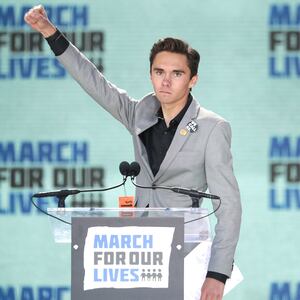We are of Gen Z. We knew each other best from astronomy class our senior year of high school in a somewhat “average,” largely white, upper-middle-class American town. We were normal-ass kids doing normal-ass things when, on Valentine’s Day 2018, a shooter came into our school killing 17, and our lives were never to be the same again.
That day, I, Sam, was shot multiple times with an AR-15 in Holocaust studies class and witnessed my classmates murdered in front of me. Since then, I have spent my time evolving through PTSD and finding my voice as a gun violence prevention activist and artist.
I, David, was also a student at Marjorie Stoneman Douglas High School. That day in lockdown, texting in the dark, my sister, a freshman, lost four of her friends. In the days that followed, while Sam faced what would be a lifetime of recovery from wounds both physical and emotional, me and my classmates founded the March For Our Lives movement that catalyzed school walkouts across the country and one of the largest youth protests in American history.
Today, we are both college students navigating the everyday challenges of 21-year-old life while trying to be the voices of our friends slain on 2/14/18—along with the more than 1,800 youngsters across the nation who lose their lives each year to gun violence. While we look forward to experiencing some sense of “normal, non-virtual life” when we return to school in the fall after quarantining from an unprecedented pandemic, we worry about the chance of random gunfire in our classrooms, movie theaters, supermarkets, and other public spaces.
In just the first four months of 2021, there have been over 160 mass shootings. As mass shooting survivors, we make up less than 2 percent of kids lost to gun violence—now the largest killer of America’s youth. But our peers in Black and brown communities are 14 times more likely to die from guns, and they have been fighting to have their voices heard in this battle for years. As our film Us Kids illustrates, we came together, along with hundreds of thousands of other young people, with a common denominator of trauma and a desperate plea to change the maddening narrative of complacency toward the epidemic of gun violence in our country.
We are traumatized and, yes, angry. Statistically speaking, when it comes to guns and dead kids, our lives are cheap compared to those of kids in other economically developed countries. As a society, we’ve managed in the past to address other issues that threaten the safety of youth—drunk driving, drinking, and smoking, to name a few—and while we press for our federal government to enact sensible and crucial gun-reform laws that will save lives, we know that public apathy is perhaps our greatest enemy. Partisan gridlock on the federal level means that we need to go hyperlocal and focus on our own backyards, on laws at state and local levels, on intergenerational dialogue—supporting kids with boots on the ground, and most importantly looking at the intersectional roots of why gun violence happens in the first place.
Our experience of working on this documentary and reclaiming our narrative permanently altered our understanding of the role systemic injustice plays in the creation of gun violence. We must have a much broader conversation around gun violence as a symptom of racial inequality, white supremacy, and economic inequality. We need to hear more stories from kids who are disproportionately affected by guns on a daily basis.
While the adult population may become increasingly numb with each new shooting that hits the news, kids do not have that luxury. We face paralyzing anxiety over this and so many other issues that threaten our futures, and we become more traumatized and more enraged with each triggering incident. We have to take a harder look at the causes of our failure to respond to this crisis. We’re sick of the dysfunction that results in inaction. We’re sick of the greed, inefficiency, stupidity, and selfishness of so many of our elected. Yes, the system is broken, but until we figure out how to fix the filibuster and everything else, let’s get stuff done. That’s why we turned out in record numbers for the 2018 midterms and the 2020 general election (with youth in BIPOC communities at its highest numbers, by the way), and that is precisely why we need Gen Z to exceed that in the 2022 midterms and beyond—to continue to keep gun violence at the forefront of voting priorities. But we also need our political engagement to go beyond the voting booth, so that we can combat the injustices of which gun violence is a symptom.
“You either have to become optimistically nihilistic or blissfully ignorant” is a line delivered in the latter part of our film. Another from me, Sam: “I think the world’s gone to shit… but I do think people in the world will get better.”
We are counting on Gen Z to be those people. We have the power of time, and kids don’t tend to relent. Us Kids are not going away.



